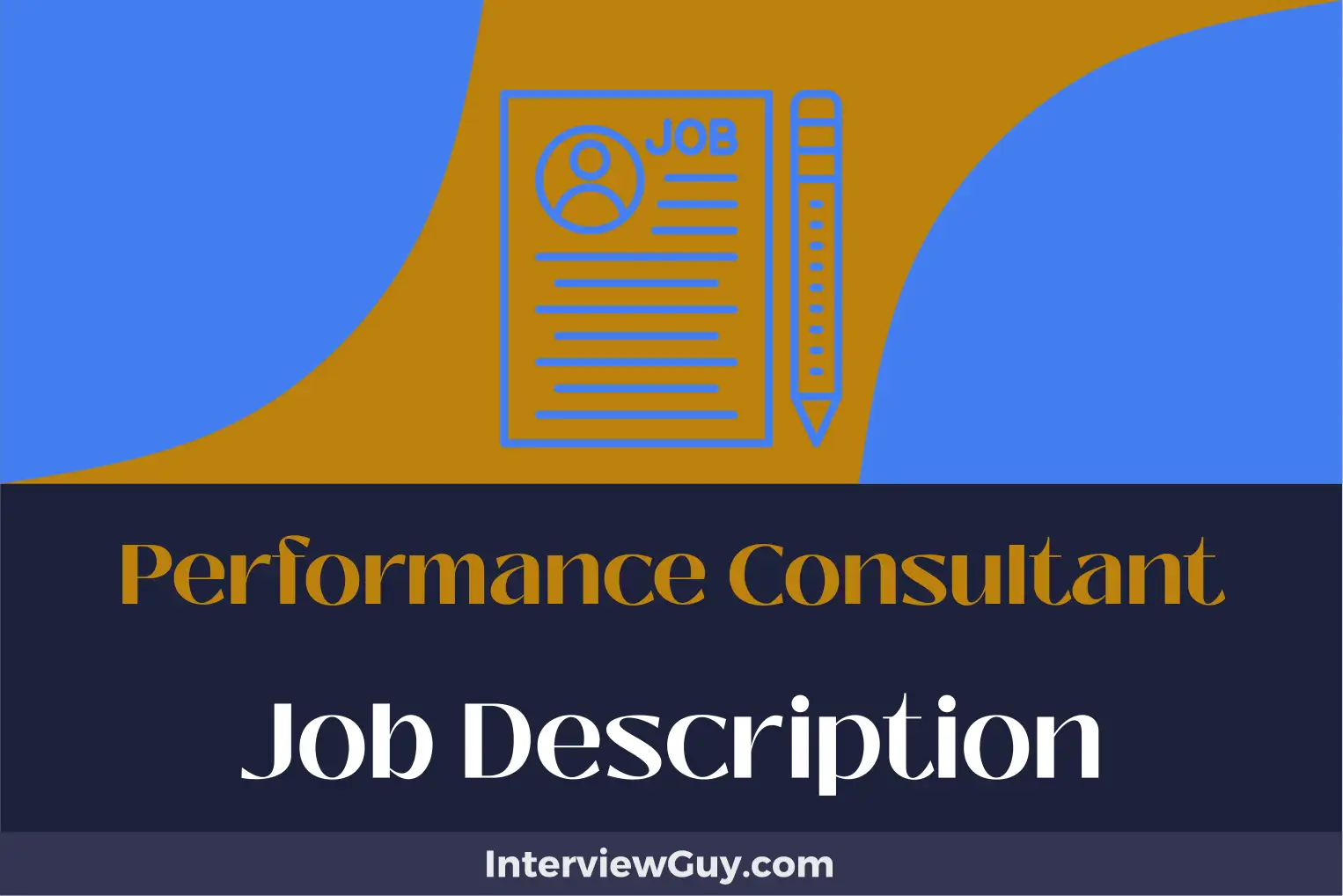Performance Consultant Job Description [Updated for 2026]

In the fast-paced corporate world, the emphasis on performance consultants has never been more pronounced.
As businesses strive for excellence, the demand for insightful minds who can diagnose, enhance, and maintain organizational performance is escalating.
But what exactly is expected from a performance consultant?
Whether you are:
- A job seeker trying to grasp the core responsibilities of this role,
- A hiring manager defining the ideal candidate,
- Or simply curious about the intricacies of performance consultancy,
You’ve come to the right place.
Today, we present a customizable performance consultant job description template, designed for effortless integration into job boards or career sites.
Let’s delve right into it.
Performance Consultant Duties and Responsibilities
Performance Consultants analyze an organization’s operations and develop strategies to improve performance.
They are responsible for understanding the business objectives, providing consultation to improve efficiency, productivity, and profitability.
They have the following duties and responsibilities:
- Analyze and assess the processes, workflows and systems currently in use by the organization
- Identify performance gaps and areas for improvement within the organization
- Develop and implement effective solutions and strategies to address identified performance gaps
- Consult with business leaders and employees to understand their needs and challenges
- Design and deliver training programs to boost employee performance
- Monitor and evaluate the effectiveness of performance improvement initiatives
- Provide regular feedback and recommendations to business leaders on performance trends and improvement strategies
- Create detailed reports on performance metrics and the impact of implemented strategies
- Stay informed of the latest trends and developments in performance consulting and management
- Collaborate with other departments to ensure the alignment of performance strategies with organizational goals
Performance Consultant Job Description Template
Job Brief
We are looking for a dedicated Performance Consultant to evaluate, improve and maintain the performance of our employees.
Performance Consultant responsibilities include analyzing performance metrics, designing performance improvement plans, and facilitating training sessions.
Our ideal candidates are familiar with performance management systems, have a strong understanding of the training and development process, and possess excellent communication skills.
Ultimately, the role of the Performance Consultant is to facilitate a high-performance culture that aligns with our company’s mission, values and objectives.
Responsibilities
- Analyze performance data to evaluate employee productivity and efficiency
- Design and implement performance improvement plans
- Conduct training and development sessions for employees
- Facilitate change management initiatives
- Assess the impact of training on employee performance
- Provide coaching and mentoring to managers and team leaders
- Collaborate with HR and management to develop performance standards
- Monitor and report on performance metrics
- Identify areas for improvement and design innovative solutions
- Ensure compliance with company policies and legal regulations
Qualifications
- Proven work experience as a Performance Consultant, Training Consultant or similar role
- Experience with performance management systems
- Ability to analyze performance metrics and design improvement plans
- Excellent communication and presentation skills
- Strong knowledge of training and development methods
- Experience with coaching and mentoring
- Proficiency in MS Office and Learning Management Systems (LMS)
- BSc degree in Business Administration, Human Resources, Organizational Psychology or relevant field
Benefits
- 401(k)
- Health insurance
- Dental insurance
- Retirement plan
- Paid time off
- Professional development opportunities
Additional Information
- Job Title: Performance Consultant
- Work Environment: Office setting with options for remote work. Some travel may be required for team meetings or client consultations.
- Reporting Structure: Reports to the HR Manager or Head of Department.
- Salary: Salary is based upon candidate experience and qualifications, as well as market and business considerations.
- Pay Range: $75,000 minimum to $120,000 maximum
- Location: [City, State] (specify the location or indicate if remote)
- Employment Type: Full-time
- Equal Opportunity Statement: We are an equal opportunity employer and value diversity at our company. We do not discriminate on the basis of race, religion, color, national origin, gender, sexual orientation, age, marital status, veteran status, or disability status.
- Application Instructions: Please submit your resume and a cover letter outlining your qualifications and experience to [email address or application portal].
What Does a Performance Consultant Do?
Performance Consultants work in various industries, assisting organizations in improving their efficiency and effectiveness by addressing performance gaps.
They can work as independent consultants or as part of a consulting firm.
They work closely with business leaders and stakeholders to understand the organization’s objectives, assess current performance levels, and identify areas for improvement.
Their job involves conducting comprehensive performance reviews and evaluations, formulating strategies to address performance gaps, and monitoring the implementation of these strategies.
Performance Consultants are also responsible for providing coaching and training to employees, facilitating change management processes, and ensuring that improvements lead to desired business outcomes.
They often utilize a wide range of methodologies and tools to measure performance, analyze data, and present their findings in a clear, concise manner.
A significant part of their role also involves communication and collaboration.
They need to be able to effectively communicate their recommendations to management and team members, facilitate discussions, and build consensus around the proposed changes.
Performance Consultant Qualifications and Skills
A proficient Performance Consultant should have the skills and qualifications that align with the job description, such as:
- Strong analytical skills to assess the performance of individuals and organizations, identify gaps and provide practical solutions
- Excellent interpersonal and communication skills to collaborate with team members, stakeholders, and clients, and to deliver feedback effectively
- Proficiency in using performance management tools and software to gather data and generate insightful reports
- Ability to design and implement performance improvement plans and strategies that align with organizational objectives
- Problem-solving skills to identify the root cause of performance issues and develop effective solutions
- Strong leadership and project management skills to lead performance improvement initiatives and ensure they are executed successfully
- Knowledge of performance management principles and best practices
- Ability to facilitate training and development sessions to improve individual and team performance
Performance Consultant Experience Requirements
Entry-level Performance Consultants typically have 1 to 2 years of experience, often gained through internships or part-time roles in HR or business consulting.
They may also gain practical experience in roles such as Training Coordinator, Human Resource Specialist, or other related fields, which can significantly contribute to their understanding of performance management strategies.
Candidates with more than 3 years of experience usually have developed their skills in coaching, strategic planning, and change management in roles such as Performance Analyst or HR Consultant.
Those with over 5 years of experience likely have some leadership and project management experience.
They may have also participated in large-scale organizational changes or talent development programs.
This group of professionals may be ready for a senior position or a role that includes overseeing a team or managing multiple client relationships.
In addition to these experience requirements, Performance Consultants often hold a bachelor’s or master’s degree in business, human resources, organizational psychology, or a related field.
Ongoing education and certification in performance management or related areas are also beneficial.
Performance Consultant Education and Training Requirements
A Performance Consultant typically has a bachelor’s degree in business, human resources, psychology, or a related field.
An understanding of organizational behavior, team dynamics, and effective communication are essential to this role.
Therefore, courses in these areas are highly beneficial.
Additionally, a Master’s degree in Organizational Development, Industrial/Organizational Psychology, or Business Administration with a concentration in Human Resources can provide a solid foundation for this role.
However, this is not always required but can be seen as a distinct advantage.
Performance Consultants also benefit from having certifications in relevant areas such as Certified Performance Technologist (CPT), Certified Professional in Learning and Performance (CPLP), or Project Management Professional (PMP).
Practical experience in consulting, project management, and problem-solving is crucial, and many consultants gain this experience through internships or relevant work positions.
Ongoing training and staying updated with the latest industry trends, methodologies, and technologies are a must for Performance Consultants to ensure their skills remain relevant and effective.
Performance Consultant Salary Expectations
A Performance Consultant can expect to earn an average salary of $90,581 (USD) per year.
However, this figure can fluctuate depending on factors such as the consultant’s level of experience, industry knowledge, and geographical location.
Additionally, the size and sector of the employing company can also significantly influence earnings.
Performance Consultant Job Description FAQs
What skills does a Performance Consultant need?
Performance Consultants require a mix of analytical and interpersonal skills.
They should be able to assess and interpret data, identify performance gaps, and develop effective solutions.
Strong communication and collaboration skills are also crucial, as they often work with various departments and levels of management.
Knowledge of performance improvement methodologies, such as Lean or Six Sigma, can be a significant advantage.
Do Performance Consultants need specific qualifications?
Most Performance Consultants hold a bachelor’s degree in business, human resources, or a related field, and many employers prefer candidates with a master’s degree.
Additional certifications like Certified Performance Technologist (CPT) or Lean Six Sigma can be advantageous.
Relevant experience in performance consulting, training, or human resources is often required.
What should you look for in a Performance Consultant resume?
A good Performance Consultant resume should highlight strong analytical skills, knowledge of performance improvement methodologies, and a track record of successful performance enhancement projects.
Look for experience in cross-functional team collaboration, problem-solving, and strategic planning.
Qualifications in business, HR, or related fields are usually expected.
What qualities make a good Performance Consultant?
A good Performance Consultant has a keen eye for detail, a strong understanding of business operations, and a talent for problem-solving.
They must be skilled at building relationships across all levels of an organization, leading teams, and influencing others.
A commitment to continuous learning and staying abreast of the latest industry trends is also essential.
What is the role of a Performance Consultant in organizational development?
Performance Consultants play a crucial role in organizational development.
They analyze performance data, identify gaps, and develop strategies to enhance productivity and efficiency.
They often work with various departments to implement these strategies, providing training and guidance as needed.
Performance Consultants also help foster a culture of continuous improvement, contributing to an organization’s long-term growth and success.
Conclusion
And there you have it.
Today, we’ve unveiled the true essence of being a performance consultant.
Surprise surprise?
It’s not just about improving performance.
It’s about shaping the future of business, one strategy at a time.
Armed with our go-to performance consultant job description template and real-world examples, you’re ready to make your move.
But why stop there?
Delve further with our job description generator. It’s your ladder to meticulously crafted job listings or refining your resume to excellence.
Remember:
Every strategy is part of the larger framework.
Let’s construct that future. Together.
How to Become a Performance Consultant (Complete Guide)
Stressful Jobs Exposed: The Realities That Will Shock You!
Lazy? Maybe. Rich? Definitely! Easy Jobs That Pay Off Big Time!
Eccentric Employment: The Weirdest Ways to Make a Living
Shocking but True: These Jobs Have the Lowest Salaries – Find Out Why!

![Crown Jeweler Job Description [Updated for 2026]](https://interviewguy.com/wp-content/uploads/2024/05/crown-jeweler-job-description-768x512.webp)
![Company Manager Job Description [Updated for 2026]](https://interviewguy.com/wp-content/uploads/2024/05/company-manager-job-description-768x512.webp)
![Salesforce Developer Job Description [Updated for 2026]](https://interviewguy.com/wp-content/uploads/2024/02/salesforce-developer-job-description-768x512.webp)
![Certified Nurse Anesthetist Assistant Job Description [Updated for 2026]](https://interviewguy.com/wp-content/uploads/2024/05/certified-nurse-anesthetist-assistant-job-description-768x512.webp)
![Equine Sports Therapist Job Description [Updated for 2026]](https://interviewguy.com/wp-content/uploads/2024/07/equine-sports-therapist-job-description-768x512.webp)
